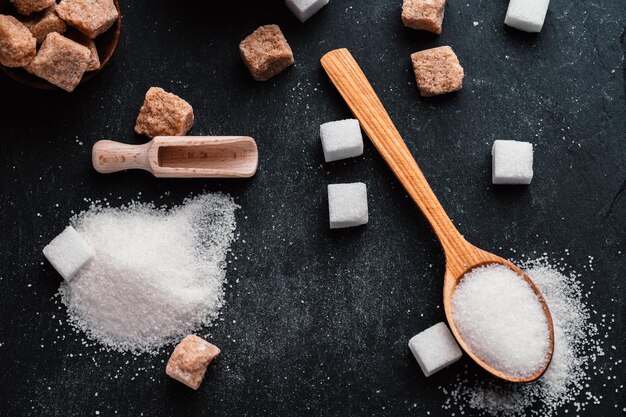Your Guide to What Is The Best Sugar Substitute For Diabetics
What You Get:
Free Guide
Free, helpful information about Diabetes FAQ and related What Is The Best Sugar Substitute For Diabetics topics.
Helpful Information
Get clear and easy-to-understand details about What Is The Best Sugar Substitute For Diabetics topics and resources.
Personalized Offers
Answer a few optional questions to receive offers or information related to Diabetes FAQ. The survey is optional and not required to access your free guide.
Finding the Best Sugar Substitute for Diabetics: Your Guide to Healthier Choices
Navigating a diabetic-friendly diet can feel like threading a needle, especially when it comes to sugar. With countless sugar substitutes on the market, which one is the best choice for diabetics? Whether you're a culinary enthusiast or someone trying to manage blood sugar levels, it’s crucial to make informed decisions about what you consume.
Understanding the Basics of Sugar Substitutes
Understanding which sugar substitute to choose begins with knowing their types:
Artificial Sweeteners: These are synthetic sugar substitutes, like aspartame, saccharin, and sucralose (commonly known as Splenda). They are calorie-free and much sweeter than regular sugar, so only small amounts are needed.
Sugar Alcohols: Often found in sugar-free products, sugar alcohols like erythritol, xylitol, and sorbitol have fewer calories than sugar. They can, however, cause digestive issues if consumed in large quantities.
Natural Sweeteners: This category includes options like stevia and monk fruit. They are derived from natural sources and have zero calories, making them a popular choice for those seeking a more "natural" substitute.
Stevia and Monk Fruit: The Diabetic-Friendly Options
Among these options, stevia and monk fruit stand out as the best choices for diabetics. Both are natural, have zero calories, and do not raise blood sugar levels.
Stevia: Derived from the leaves of the Stevia plant, it’s up to 300 times sweeter than sugar. It contains no carbohydrates and is widely recognized as a safe sugar alternative for diabetics.
Monk Fruit: Extracted from the monk fruit itself, this sweetener is also zero-calorie and doesn't impact blood sugar levels. It’s favored for its clean, sweet taste without the aftertaste that some sweeteners have.
Tips for Using Sugar Substitutes
Measure with care: Many substitutes require adjustments in quantity when replacing sugar in recipes, so experimentation may be necessary.
Check labels: Some products blend natural and artificial sweeteners, so always read the label to understand what you're consuming.
Moderation is key: Even with sugar alternatives, balance and moderation remain vital to maintaining optimal health.
Beyond Sweeteners: Exploring Financial and Educational Resources
Managing diabetes often involves balancing medical costs with daily expenses. Here are some resources to lighten the financial load and improve your understanding of diabetes management:
Government Aid Programs: Explore options like Medicaid and the Medicare Diabetes Prevention Program, which can help cover the costs of treatments and medications.
Financial Assistance for Medications: Look into pharmaceutical assistance programs that offer discounts or free medications to eligible individuals.
Debt Relief Solutions: Managing medical bills can be stressful. Consider consulting credit counseling services or debt relief agencies to explore options for simplifying or reducing debt.
Educational Grants and Resources: Take advantage of diabetes education programs, often covered by insurance, to gain a deeper understanding of diabetes management and nutritional planning.
Community Support Networks: Join local or online diabetes support groups to share experiences and receive advice from those facing similar challenges.
🔍 Quick Reference: Financial and Educational Resources
- 💰 Aid Programs: Medicaid, Medicare Diabetes Prevention Program
- 💊 Assistance for Medications: Pharmaceutical assistance programs
- 🌐 Debt Relief: Credit counseling services, debt relief agencies
- 🎓 Educational Opportunities: Diabetes education programs
- 🤝 Community Support: Local and online diabetes support groups
Making informed choices about sugar substitutes and leveraging available resources can help you lead a healthier, more financially secure lifestyle. Whether you prefer stevia or monk fruit as your sweet treat of choice, the path to better health is paved with knowledge and support.
What You Get:
Free Diabetes FAQ Guide
Free, helpful information about What Is The Best Sugar Substitute For Diabetics and related resources.

Helpful Information
Get clear, easy-to-understand details about What Is The Best Sugar Substitute For Diabetics topics.

Optional Personalized Offers
Answer a few optional questions to see offers or information related to Diabetes FAQ. Participation is not required to get your free guide.


